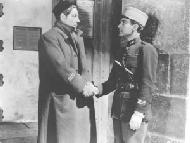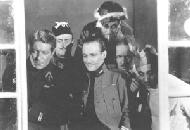In form, Grand Illusion is an escape story; yet who would think of it in this way? It's like saying that Oedipus Rex is a detective story. Among other things, this film is a study of human needs and the subtle barriers of class among a group of prisoners and their captors during the First World War. The two aristocrats—the German prison commander von Rauffenstein (Erich von Stroheim) and his prisoner the French officer de Boeldieu (Pierre Fresnay)—share a common world of memories and sentiments. Though their class is doomed by the changes that produced the war, they must act out the rituals of noblesse oblige and serve a nationalism they don't believe in. The Frenchman sacrifices his life for men he doesn't really approve of—the plebeian Maréchal (Jean Gabin) and the Jew Rosenthal (Marcel Dalio). Jean Renoir directed this elegy for the death of the old European aristocracy, and it is one of the true masterpieces of the screen. Von Rauffenstein and de Boeldieu are in a great romantic tradition; Cyrano has his plume, they draw on their white gloves. Maréchal, the mechanic who has become an officer, is uneasy in the presence of urbanity and polish, but he has natural gallantry, and he's the one with survival power. The performances of von Stroheim, Fresnay, and Gabin are in three different styles of acting, and they illuminate one another. With Gabin, you're not aware of any performance; with von Stroheim and Fresnay, you are—and you should be: they represent a way of life that is dedicated to superbly controlled outer appearances.
—Pauline Kael
|

Jean Gabin and Pierre Fresnay in Grand Illusion

Jean Gabin, Gaston Modot, Pierre Fresnay, Julien Carette, Jean Dasté, and Marcel Dalio in Grand Illusion |

